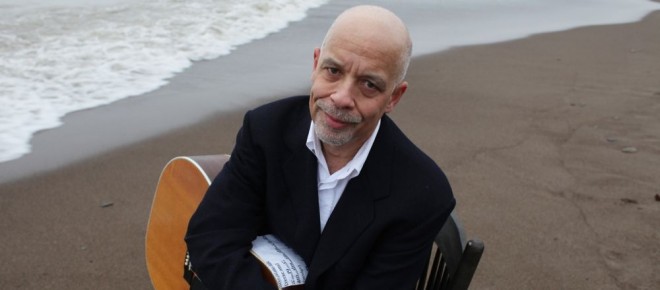Humanizing Composers and Mental Illness
Did the fact that Beethoven insisted on using 60 beans—not 59 and not 61—to make coffee mean he had OCD? Did Tchaikowsky die by choice or by accident? And Schumann? Would he have left heaps more wonderful music if he had lived today and been diagnosed as bipolar and received proper treatment rather than spending his last years in an asylum?
Those are some of the questions that musician, journalist and internationally bestselling author David Barber may address as he speaks at the May 6th High Notes Gala for Mental Health at the Flato Markham Theatre.
Barber’s many books—including Bach, Beethoven and the Boys with over 150,000 copies sold internationally over the last 25 years—were written because he wanted to humanize the composers he studied at Queen’s University.
“We studied the historical significant dates and technicalities of the composers and their music but I was interested in the stories behind them… what made them approachable. Not only were they writing this wonderful music—in the background they dealt with many of the issues we all are dealing with— illness, love, marriage breakups and financial struggles, “ he says. “Beethoven was embarrassed and depressed as he lost his hearing.”
“Composers and musicians always want to better themselves from their last composition or performance and as a result deal with stress, pressure and anxiety,” says Barber. “But artists are also lucky that they have a way of expressing how they feel through the music and that can be therapy in itself,” says Barber who attends choir practice once a week, whether motivated to go or not. “Once I am there, my mood lifts and it is a real pick-me-upper. Performing a piece of music with emotional content helps you work through your own emotions.”
Although he considers himself a generally balanced and mentally stable human being, Barber’s life hasn’t been immune to mental illness.
“We have all been touched by mental illness and I have as well. Although people close to me have stories to tell, they are really not my stories to tell. But it has affected me and that is why I have been so interested and supportive of the High Notes Avante events.”
People in Barber’s life suffered from addiction, bipolar disorder as well as post-traumatic stress. Proof that although statistics say at least 1 in 5 are suffering from a mental illness at any time—we are all affected.
“I often felt guilty and still feel guilty that I haven’t been able to do more to help these people, although I’ve tried. Taking advantage of my counseling benefits at work, and participating in support groups has helped me move forward. It helps to know that you are not alone and that others have been through something similar,” he says.
So why don’t we share our stories and talk more?
“With other diseases and injuries we know we didn’t bring it on ourselves. But with mental illness there is a false perception that people have brought it on themselves,” says Barber. “I am guilty myself. Even if I have moments when I have felt a little depressed and antsy… I personally can make myself feel better and snap out of it by going to see a funny movie or something like that,” he says. “People tend to think if we who are “normal” can snap out of it so can they.”
We don’t understand the depth and seriousness of real anxiety or fear.
“If you break your arm it is obvious that you need to go to the doctor and get a cast. The medical professionals may say you were clumsy and should have been more careful but they do not blame you for breaking your arm,” he says. “When you are really depressed—I mean Capital D depressed—it is the same. It is not your fault. I have to keep reminding myself (and I’m pretty sympathetic) that mental illnesses are just that, illnesses. Just as with a broken arm, they need care and time to heal.”
ABOUT THE HIGH NOTES GALA: You can hear David Barber speak at the High Notes Gala for Mental Health on May 6th at the Flato Markham Theatre. Dan Hill is the headlining performer and speaker. Comedienne Luba Goy will host the evening. Members of Ballet Jorgen, Grammy nominated flutist Ron Korb, pianist Robert Kortgaard, Mental Health Recovery Expert Bill MacPhee and Child & Adolescent Psychiatrist Adam Enchin, will join them. Mental health support organizations will display in the lobby. For tickets call 905.305.SHOW or visit highnotesavante.ca.
ABOUT HIGH NOTES AVANTE: High Notes Avante Productions Inc. is a non-profit organization using the power of words and music to educate and humanize mental illness. We strive to erase stigma and hope those attending our events will understand mental illness better while perhaps also starting the recovery and healing process with an inspiring evening of music and storytelling.
ABOUT DAVID BARBER: David W. Barber grew up in Ottawa and graduated with a music degree from Queen’s University, Kingston. He has been a writer, critic, copyeditor and editor in various capacities at the Kingston Whig-Standard, the Globe & Mail (Toronto) and the National Post (Toronto).
As a composer, he has written two symphonies, a Requiem mass, a mass for choir and jazz quartet based on the music of Dave Brubeck, numerous short chamber and choral works and various vocal-jazz arrangements. He continues to sing, with the Toronto Chamber Choir, with a small chamber choir called Cantores Fabularum and with various other Toronto choirs on occasion.
He is the author and editor of more than a dozen books of musical humour and literature, including Bach, Beethoven and the Boys, When the Fat Lady Sings and If It Ain’t Baroque. His varied career has also included brief stints as a roadie for Pope John Paul II, a department-store Santa Claus, a Kissing Bandit, a publicist for Prince Ranier of Monaco and (with his band Barber & The Sevilles) a backup singer for Avril Lavigne.



